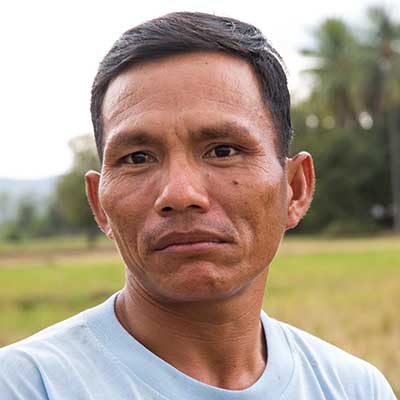Politicians’ Voices
“The CPP Will Lead the Country Forever”
Sok Eysan, a CPP spokesman, considers himself a “foot soldier” for the ruling Cambodian People’s Party, waging battle against critics and foes at the behest of higher-ranking commanders.
Phnom Penh, Cambodia The course of Sok Eysan’s life was set one day in 1979 as he wandered the streets of the Cambodian capital, desperate and alone.
It was shortly after the defeat of the Khmer Rouge regime at the hands of the Vietnamese military, which was trying to set up a new government.
In a quest to reunite with his elderly mother, the 33-year-old former teacher had struggled from the countryside to the capital city of Phnom Penh on whatever transport he could find, still wearing the ragged black uniform all citizens were forced to wear under the communist regime. He had no other clothes.
| By the numbers | National |
|---|
As he passed by the newly established Ministry of Economy, a group of Vietnamese men called out to him. Perhaps they sensed that he was an educated man – a commodity in short supply in post-Khmer Rouge Cambodia because the regime had killed intellectuals.
“They asked me where I was from,” he recalled in a recent interview with VOA Khmer. “After they learned that my background was in teaching, they asked me to work there. The Vietnamese experts said I was a knowledgeable person who could help contribute to rebuilding the country.”
He accepted the offer, and his life in politics began. Shortly after starting work as a statistician, he was promoted to become a deputy chief of staff. And the following year he formally joined the Kampuchean People’s Revolutionary Party, the progenitor of today’s Cambodian People’s Party (CPP).
“I worked there, so there was nothing to think about,” he said. Becoming a party member was not technically mandatory, but in practice it would have been difficult to rise through the ranks without joining.
Still, Sok Eysan was enthusiastic about his new government. As he sees it, the CPP’s leaders – Hun Sen, Heng Samrin, Pen Sovann, (who later preceeded Hun Sen as prime minister), and Chea Sim, all Khmer Rouge cadres who defected to Vietnam and later ousted the regime – saved him and millions of others from death.
This is an attitude common to many older Cambodians, who still recall the days when the party was the only thing standing between them and the Khmer Rouge. The party was also the only game in town back in the 1980s, when Cambodia was a one-party state.
Born in eastern Cambodia’s Svay Rieng province in 1946, Sok Eysan attended university and then worked a teacher at a secondary school in his hometown. Later, he became a high school principal. In 1972, in the midst of a civil war between the U.S.-backed Lon Nol regime and Pol Pot’s communist Khmer Rouge forces, he moved to Phnom Penh to study law.
When the Khmer Rouge seized power in April 1975, they forced the entire population of the capital out of the city on a long march to the countryside. Sok Eysan, his wife and their family had no idea where to go. They began walking toward the northeast and eventually ended up in Kratie province.
Luckily for them, Sok Eysan’s father in-law was a farm machinery technician who had skills critical to Pol Pot’s ruthless vision of forging an agrarian utopia. Sok Eysan believes this saved their lives, as Khmer Rouge officials largely left the family alone.
But he was not untouched by the regime’s brutality. Khmer Rouge soldiers shot and killed his father. His younger sister died of starvation. He became separated from his mother, and he himself was forced to labor long hours in paddy fields.
It is this experience that has made him fiercely loyal to the CPP, he says.
“We survived because of the CPP. And our living conditions, which started in misery, have progressively improved because of the CPP,” he said.
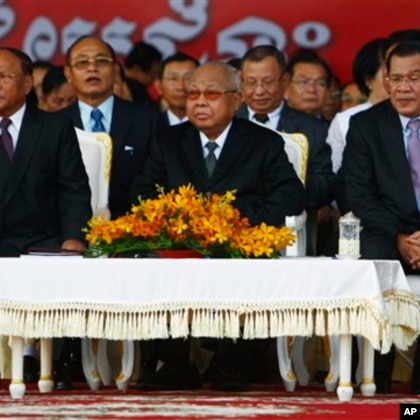
From left: Cambodian National Assembly President Heng Samrin, Senate President Chea Sim, Prime Minister Hun Sen, attend a ceremony in Phnom Penh, on Jan. 7, 2014. Sok Eysan believes that the CPP’s leaders – many of whom are former Khmer Rouge cadres who defected to Vietnam and later ousted the regime – saved him and millions of others from death. (AP)
From Civil Servant to Party Mouthpiece
Sok Eysan spent another decade working at the Ministry of Economy, rising to become deputy minister before he was forced to leave the position after the 1993 elections.
Cambodia had become a multiparty democracy under the terms of the 1991 Paris Peace Agreements. Another party, FUNCINPEC, won the country’s first post-Khmer-Rouge-regime elections. CPP government officials had to make way for an influx of appointees from the rival party.
A role was found for Sok Eysan, as an adviser to CPP President Chea Sim and later as the director general of Apsara Television and Radio, a government-affiliated media group. He then stood as a CPP candidate for parliament in 2008 and was elected as a lawmaker for Prey Veng province.
Due to his media experience, Sok Eysan was appointed as one of three official party spokesmen in 2015. Since then, he has been perhaps the best-known voice of the CPP, and much of his day is taken up answering questions from journalists.
He also promotes the party during a show broadcast several days a week on Facebook, “True Voices for the People.” In the two-hour program, which is produced by Bayon Radio, a station owned by Prime Minister Hun Sen’s daughter Hun Mana, he receives prescreened calls from listeners who generally praise the CPP and criticize the opposition.
“The CPP will lead the country forever. From this generation to the next generation, the CPP will continue leading.”
He says he considers himself a “foot soldier” for the party, doing battle against critics and foes at the behest of higher-ranking commanders.
The supreme commander in this scenario is, of course, Prime Minister Hun Sen, who has now led the country for over 30 years and declares that he intends to stay in power for at least another decade. Sok Eysan says this is a feasible goal because of the CPP’s “good party policies.”
“The CPP will lead the country forever,” he declared. “From this generation to the next generation, the CPP will continue leading. This is sustainable.”
However, some critics argue the opposite, saying that the ruling party has clung to power only through repressive tactics, and that it is unhealthy for a single group to lead the country for so long.
Over the past year, the CPP has quashed its primary opposition, the Cambodia National Rescue Party (CNRP), by arresting its leader for alleged treason and having the party dissolved by judicial order.
The coming election will feature a multitude of tiny parties, but international human rights groups and the United Nations have said it will not be free and fair in the absence of the CNRP
Sok Eysan rejected that notion, saying that the CNRP had essentially dissolved itself because it was full of criminals.
“Some say the CPP was afraid of losing the election, which is why it dissolved the party. But why was the CNRP dissolved? It was because of its illegal offenses, not because the CPP dissolved it. They made themselves dissolved,” he said.
“I think the CNRP can’t compete with the CPP under any circumstances,” he added.
As a party spokesman, Sok Eysan is now in the delicate position of having to argue that Cambodia is a thriving multiparty democracy, while also insisting that no party will ever challenge the CPP’s supremacy, and that the party’s main rivals deserve to be jailed and exiled. However, he does not see this as a contradiction.
“This is normal for a multiparty democracy with a contested field. The contender doesn’t want their opponent to be strong. Every party is the same. Other parties also want to break the CPP, but they can’t,” he said.
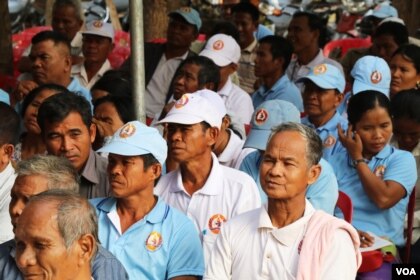
Commune councilors from the Cambodian People's Party attend a meeting with Sok Eysan, the CPP's spokesman and a senate candidate. Feb. 15, 2018. (Sun Narin | VOA Khmer)
Old Party for a New Generation?
Despite his regular appearances on Facebook, Sok Eysan does not use the social media site himself, nor does he see why it is more valuable than traditional news sources.
“It is not useful for me. I don’t want to get news via Facebook. I read the papers, listen to the radio and watch TV,” he said.
Sok Eysan is especially perplexed by the freewheeling online culture that allows users to speak their minds freely and mock the powerful.
He showed a VOA journalist several Facebook images lampooning him. In one, he had the body of a coconut and the hands of an ape, and was dressed in a hat bearing an image of the the flag of Vietnam, Cambodia’s historic enemy and mistrusted neighbor.
“Facebook users Photoshopped me like that. Doesn’t it affect my rights and freedom? Is this rights and freedom?” he asked.
“If there is no mechanism to patrol it, it becomes anarchical,” Sok Eysan said of the internet.
This attitude was widespread among the CPP’s top brass a few years ago, allowing the more internet-savvy CNRP to nearly pull off an election upset in 2013. The opposition party used Facebook to skirt restrictions on opposition media and drum up support among voters.
Now, however, the CPP has scrambled to catch up. Prime Minister Hun Sen and other senior officials maintain vigorous Facebook presences to boost their appeal. At the same time, the CPP has sought to clamp down on online speech by targeting Facebook users who criticize the government and forming an inter-ministerial committee to monitor what Cambodians say on the internet.
Still, demographics may be working against the ruling party.
The CPP has campaigned on the slogan “the party that gives life” for decades now. Its message to Cambodians has been that they owed their lives to the party’s leaders for ousting the Khmer Rouge in 1979, and should vote for them in gratitude.
But that concept might not be as resonant with younger Cambodians as it was with Sok Eysan and others of his generation, who lived through the Khmer Rouge years.
Two-thirds of Cambodia’s population of around 16 million are under 35 years old. They have no firsthand knowledge of the Cambodian civil war, and have grown up amid rising prosperity and relative openness to the outside world, an attitude far removed from the insular political landscape of the post-Khmer Rouge period.
In the last election, these young people formed the core of the CNRP’s support. Many voted for the opposition because they were frustrated with corruption and cronyism and wanted to see what was possible under a new government.
However, Sok Eysan is optimistic that the CPP will maintain its supremacy if young people simply listen to their parents and educate themselves about the source of Cambodia’s prosperity: the ruling party, which he sees as a kind of parent to the nation.
“The CPP has around 5.5 million members,” he continued. “How many children do they have? And youths don’t walk along with the CNRP. They follow their parents. They grow because of their parents. They progress because of their parents and they can study because of their parents.”
Nearly 40 years after he was first recruited into the government, Sok Eysan is as passionate as ever about the merits of the party he serves. He says he is convinced that a change in government is unnecessary, and hopes Cambodians will trust the CPP to continue leading the country indefinitely.
“New parties might be novelties, but they don’t have a deep meaning as sweet as the CPP’s,” he says. “The achievements of the CPP are plain for people to see: national benefits and the realization of the people’s wants and needs.”
Cambodia (1953 - 2018)
[x]
July 30, 2018
International community calls Cambodia's vote a “setback to democracy”
The United States says it will take further action against the government of Cambodia following a landslide victory for the ruling party. The European Union, Canada and Australia also condemn the election.
July 29, 2018

Cambodia set to become one-party state
Prime Minister Hun Sen’s ruling party says it now controls all 125 seats in the National Assembly after an election slammed by rights groups as a sham due the lack of a viable opposition,
July 29, 2018

Polls open in Cambodia's sixth national election
Cambodians head to the polls for an election from which the government has banned the only viable opposition party.
July 28, 2018

Government blocks 15 independent news sites over poll “disruption”
The Cambodian government orders internet service providers (ISPs) to block the websites of 15 news websites of independent outlets including Voice of America for two days before and during the country’s election.
July 27, 2018

Government fines former opposition officials over “clean finger” campaign
Five former CNRP officials in Battambang province are found guilty of obstructing the vote and fined $2,500 each over a Facebook post supporting an election boycott campaign.
July 27, 2018

Election campaign ends as Cambodians prepare to vote
Cambodian political parties wind up their campaigning ahead of a general election expected to be an easy victory for the ruling party.
July 25, 2018

U.S. House passes Cambodia sanctions bill
U.S. House of Representatives passes the Cambodia Democracy Act, paving the way for sanctions to be imposed against members of Prime Minister Hun Sen’s inner circle.
July 25, 2018

Japan opts out of sending election monitors to Cambodia
Japan says it won't send election monitors to Cambodia for the July 29 vote even though Tokyo, a major donor to the Southeast Asian nation, has sent observers to many previous elections.
July 22, 2018

Cambodia threatens legal action against non-voters
The government orders fines or even the arrest of people who uploads images on social media as part of an opposition-organized campaign to boycott the vote.
July 10, 2018

Cambodian government institutions face cyberattack
Cyberattackers are caught hacking key Cambodian government institutions in what is strongly believed to be a coordinated Chinese government assault ahead of the July 29 national elections, according to an investigation by FireEye, a U.S. cybersecurity firm.
July 7, 2018

Election campaign kicks off
Electioneering kicks off for the July 29 national elections. Twenty political parties are registered to participate.
June 27, 2018

50,000 observers to monitor July election, NEC says
Cambodia’s National Election Committee (NEC) says 50,000 observers -- some from China, Myanmar and Singapore -- will monitor July 29 election.
June 20, 2018
U.N. calls political climate in Cambodia “not conducive to a free and fair election”
At the U.N. Human Rights Council, New Zealand and other nations issue a statement calling on the Cambodian government to reverse course, saying the current political environment in Cambodia is not “conducive to holding free, fair and genuine national elections.”
June 12, 2018
U.S. sanctions Hun Sen’s top bodyguard
United States imposes sanctions on Hing Bun Heang, the head of Hun Sen’s bodyguards, citing human rights abuses.
May 28, 2018
Government forms task forces to monitor online content ahead of July election
The government issues an order that it will work with telecommunication firms to monitor and control online news deemed to cause “instability,” as part of the government’s crackdown ahead of July 29 election.
May 24, 2018
NEC sets controversial Journalist Code of Conduct on election coverage
Cambodia's National Election Committee (NEC) issues a controversial code of conduct for journalists covering the July 29 election. It includes a ban on asking detailed questions about results.
May 15, 2018
20 political parties registered
Despite dissolution of CNRP, 20 political parties, including the ruling CPP, register to participate in July 29 election.
May 15, 2018
Election monitoring group backs out of observing July election
The respected Committee for Free and Fair Elections in Cambodia (Comfrel) says it will not observe and monitor the July election, citing the Cambodian government’s accusation against the group and other organizations in promoting a “color revolution” in Cambodia.
May 9, 2018
U.N. calls for release of Kem Sokha
The U.N. Working Group on Arbitrary Detention and the International Federation for Human Rights issues a statement demanding the immediate release of Kem Sokha, leader of the dissolved opposition CNRP party, calling his imprisonment “inhumane” and “shameful.”
May 5, 2018

Phnom Penh Post sold
The country’s last remaining independent English-language newspaper, the Phnom Penh Post, is sold to a Malaysian investor whose company has links to Hun Sen.
May 4, 2018
PM Hun Sen threatens legal measure against election boycott
Prime Minister Hun Sen describes Sam Rainsy’s call for an election boycott as “a violation of electoral law.”
April 8, 2018
Sam Rainsy calls for July election boycott
Former CNRP leader Sam Rainsy calls on his supporters and voters to boycott the July election.
Jan 2018

Sam Rainsy launches the CNRM
Former CNRP president Sam Rainsy launches the Cambodia National Rescue Movement (CNRM), which he envisions as keeping the CNRP “alive” from abroad. He says it “cannot be dissolved” because it is not registered with the government in Cambodia. Sam Rainsy said the movement's plan includes ensuring free and fair elections in Cambodia in July.
Nov 16, 2017

Supreme Court orders CNRP dissolution
The Supreme Court dissolves the CNRP, a move that causes some opposition members to join Hun Sen's ruling CPP, while opposition leaders flee the country or are forced out of politics.
Oct 3, 2017

Mu Sochua flees country
Opposition lawmaker Mu Sochua flees Cambodia after Prime Minister Hun Sen threatens to arrest opposition politicians in the wake of Kem Sokha's arrest in September.
Sept 2017
RFA ceases operations in Cambodia
Radio Free Asia ceases operations in Cambodia after nearly 20 years, citing the government’s crackdown on media. Dozens of radio affiliates in Cambodia that sold airtime to RFA and VOA are shut down, with the government citing licensing issues. Other remaining licensed radio affiliates stop broadcasting RFA and VOA content.
Sept 4, 2017

Cambodia Daily newspaper shuts down
The independent Cambodia Daily newspaper announces it will cease operations in Cambodia after 24 years when it is slapped with a $6.3 million tax bill, which its publishers said was politically motivated and impossible to pay.
Sept 3, 2017

Kem Sokha arrested
Opposition leader Kem Sokha is arrested at his Phnom Penh home for alleged treason. The government accuses him of conspiring with the U.S. to bring down the Cambodian government. Prime Minister Hun Sen warns the CNRP not to defend Kem Sokha at the risk of being dissolved.
Aug 23, 2017
National Democratic Institute halts operations
The Cambodian government forces the U.S.-funded National Democratic Institute to halt its operations in Cambodia, saying the group is not legally registered.
July 10, 2017
National Assembly bars parties from affiliating with criminals
The National Assembly passes bill barring political parties from having any formal affiliation with convicted criminals.
June 2017
Fourth commune council elections
The CPP wins the majority of seats, but loses ground to the CNRP.
March 2017

Kem Sokha succeeds Sam Rainsy
Kem Sokha succeeds Sam Rainsy as the CNRP president.
Feb 11, 2017

Sam Rainsy resigns from CNRP
Sam Rainsy, the self-exiled leader of the CNRP, resigns in an attempt to save the party from dissolution after Prime Minister Hun Sen threatens to change the law to enable the government to dissolve parties with officials who have committed criminal offenses.
Dec 2, 2016

King Sihamoni pardons Kem Sokha
King Norodom Sihamoni pardons Kem Sokha, as requested by Prime Minister Hun Sen.
Sept 9, 2016
Kem Sokha sentenced to five months in prison
Phnom Penh Municipal Court sentences Kem Sokha to five months in prison over a case involving prostitution charges that are believed to be politically motivated. Kem Sokha does not appear in court.
July 10, 2016

Government critic Kem Ley killed
Kem Ley, a well-known political activist and government critic, is shot dead in broad daylight at a petrol station in central Phnom Penh, in what police say is a personal dispute over money, a claim his wife denies.
June 2016
Kem Sokha in hiding
Kem Sokha goes into hiding at the CNRP headquarters to avoid arrest after being accused of procuring a prostitute.
April 2016

Five officials arrested for alleged involvement in the case against Kem Sokha
Four officials with the human rights group Adhoc, as well as the deputy secretary-general of the National Election Committee, are arrested for involvement with the alleged prostitution case against Kem Sokha.
Nov 16, 2015

Sam Rainsy stripped of position, immunity
The government strips Sam Rainsy of his lawmaker status and immunity while the opposition leader is traveling outside Cambodia. The move paves the way for arresting him in connection with a defamation case.
Oct 2015

Mob beats two CNRP lawmakers
Pro-government mob beats two CNRP lawmakers in front of the National Assembly; the mob demands that National Assembly Vice President Kem Sokha step down.
July 13, 2015
National Assembly OKs crackdown on civil society groups
Cambodia's National Assembly approves a controversial law that critics say gives authorities sweeping power to crack down on civil society groups challenging the government.
April 2015

Bipartisan election committee formed
An overhauled National Election Committee, created by bipartisan agreement, moves to spearhead electoral reform.
July 22, 2014
CNRP, Hun Sen strike deal
The CNRP strikes deal with Prime Minister Hun Sen, ending yearlong boycott of parliament.
July 16, 2014
Opposition leaders charged with 'insurrection'
The Cambodian government charges six opposition politicians with leading an “insurrection” after a clash with security forces that prevented opposition supporters from rallying in a public park.
Jan 2014

Military police crack down on CNRP
Military police crack down on CNRP and garment worker protest, ending months of street demonstrations that leave at least four people dead.
Sept-Dec 2013

CNRP supporters protest election results
The CNRP and its supporters hold mass protests in Phnom Penh over the contested election results, calling for Hun Sen’s resignation and an election restaging.
July 28, 2013
Fifth national elections
Cambodia holds its fifth national elections, and the opposition CNRP wins 55 of 123 seats in the National Assembly. The CPP wins the remaining 68 seats. The CNRP rejects the results and launches a high-profile boycott of parliament.
July 2013

Sam Rainsy returns ahead of elections
After King Norodom Sihamoni pardons Sam Rainsy at Hun Sen’s request, the opposition leader returns to Cambodia days before the national elections.
Oct 15, 2012

King Sihanouk dies
King Norodom Sihanouk dies of a heart attack. He was 89 years old, and had spent most of his time after abdicating in 2004 outside Cambodia, favoring Beijing and Pyongyang.
July 17, 2012

CNRP was established in Manila
Top officials from the SRP and HRP meet in Manila to finalize their merger into a new party: the Cambodia National Rescue Party (CNRP).
June 2012
Third commune elections
Cambodia holds third commune elections and the CPP wins 61.8 percent of communes.
Sept 2010

Sam Rainsy flees Cambodia
Sam Rainsy flees the country again, facing charges of disinformation and falsifying maps after criticizing the government’s handling of the Vietnamese border demarcation.
July 2008
CPP wins majority in national elections
Hun Sen's CPP wins a majority of votes in the national elections.
July 2007
Kem Sokha establishes HRP
Kem Sokha, who founded the human rights organization Cambodian Center for Human Rights in 2002, establishes the Human Rights Party (HRP).
April 2007
Second commune elections
Cambodia holds its second commune elections. The CPP wins 98.2 percent of communes, while the SRP wins 1.7 percent.
Oct 2006

FUNCINPEC ousts Ranariddh
The royalist FUNCINPEC party ousts Prince Ranariddh as president following an accusation by Hun Sen that the prince was appointing unqualified individuals to political positions.Ranariddh was sentenced by the lower court to 18 months in prison and fined $150,000 for alleging breach of trust for buying land with $3.6 million taken from the sale of FUNCINPEC headquarters.
March 2006
Ranariddh resigns, flees to France
Prince Ranariddh resigns as president of the National Assembly after Hun Sen fires then-Co-Minister of the Interior Norodom Sirivudh and Co-Minister of Defense Nhiek Bun Chay. Ranariddh flees to France.
Feb 2006

Sam Rainsy receives royal pardon
Rainsy returns to Cambodia after months of exile to avoid imprisonment on a defamation conviction over his criticism of the government’s border policy with Vietnam. He joins with the CPP to change the electoral law to require a simple majority rather than a two-thirds majority, leaving the royalist FUNCIPEC party less important in the coalition government.
Oct 2005
Under pressure, king signs border treaty
Hun Sen threatens to abolish Cambodia’s monarchy as King Sihamoni delays in signing a controversial border treaty with Vietnam, Cambodia's historic enemy. The king agrees to sign the treaty.
Oct 2004

Norodom Sihamoni becomes king
Norodom Sihamoni succeeds his father King Norodom Sihanouk after a surprise abdication. Prime Minister Hun Sen and National Assembly Speaker Prince Norodom Ranariddh endorse Sihamoni.
July 27, 2003
CPP wins national elections
Hun Sen re-elected as prime minister.
Feb 3, 2002
First commune elections held
Cambodia holds its first-ever commune elections. The CPP wins a majority of seats on local administrative bodies known as commune councils, and thus appoints the majority of commune chiefs.
Nov 1998
Hun Sen and Ranariddh agree to form a coalition government
Hun Sen and Ranariddh agree to form a coalition government, allowing Hun Sen to remain as the prime minister and Prince Ranariddh to become the president of the National Assembly. FUNCINPEC’s agreement with CPP left the SRP as the country’s main opposition party.
July 26, 1998
CPP wins national elections
Hun Sen's CPP wins a majority of seats in national elections, followed by FUNCINPEC and the SRP.
March 1998

Prince Ranariddh returns
Prince Ranariddh returns to Cambodia to run in the national elections.
July 1997
Troops clash in Phnom Penh; Prince Ranariddh exiled
Troops aligned with the CPP and the FUNCINPEC clash in Phnom Penh after public arguments between Hun Sen and Prince Ranariddh become increasingly heated. The prince goes into exile and is ousted from his position a month later.
1995

Sam Rainsy founds KNP
Sam Rainsy founded the the opposition Khmer Nation Party (KNP).
June 1993
FUNCINPEC and CPP form coalition government
With King Norodom Sihanouk's intervention, FUNCINPEC and the CPP agree to form a coalition government, with Norodom Ranariddh as first prime minister and Hun Sen as second prime minister.
May 23-28, 1993
First post-war elections held
Cambodia holds first post-Khmer Rouge-era presidential elections under the auspices of the U.N. Hun Sen’s Cambodia People's Party, a linear descendant of the Kampuchean People’s Revolutionary Party, which gave birth to the Khmer Rouge, loses to Norodom Ranariddh’s royalist FUNCINPEC.
Oct 23, 1991

Paris Accords Accords signed
Nineteen nations sign the Paris Peace Accords, formally ending Cambodia's civil war.
Sept 26, 1989
Vietnam leaves Cambodia
Vietnamese troops leave Cambodia after a decade of occupation.
Jan 14, 1985
Hun Sen becomes prime minister
National Assembly appoints Hun Sen prime minister.
Jan 7, 1979
Khmer Rouge regime ends
A group of former Khmer Rouge soldiers, including Cambodia's future prime minister, Hun Sen, end the Khmer Rouge regime. Backed by the Vietnamese military, the group liberates Cambodia and Vietnam sponsors formation of a new Cambodian government.
April 17, 1975

Khmer Rouge takeover Cambodia
The China-backed Khmer Rouge occupy Phnom Penh. Over the next three years, eight months and 20 days, the regime will cause the deaths of at least 1.7 million people.
March 1970
Coup topples Sihanouk
U.S.-backed Gen.Lon Nol leads coup that topples Sihanouk.
April 1960

King Suramarit dies
Sihanouk accepts role as head of state.
Sept 1955
Sihanouk becomes prime minister
King Sihanouk becomes prime minister after abdicating in favor of his father, Norodom Suramarit.
Nov 9, 1953
Cambodia gains independence
King Norodom Sihanouk declares Cambodia’s independence from France.
Reference
[x]
National Elections
Since 1993, Cambodia has held a national election every five years. Cambodian people aged 18 and above are eligible to vote for any political parties they like. The party that wins the majority of votes then nominates its members to the National Assembly. Today, there are 123 National Assembly seats, 24 provinces and the capital Phnom Penh. The majority party in the National Assembly forms the national government, provincial governments, select the prime minister and various ministers.
All nominations must be approved by the king. Since 1998, the ruling Cambodian People’s Party (CPP) has won each national election.
Commune Elections
As Cambodia stabilized and focused on institution building, it launched commune elections in 2002. Communes are the most local of administrative bodies, overseeing all the villages and their residents in a given area.
Commune elections are held every five years, and the political party that wins the majority selects the commune chief in that commune.
Commune chiefs work closely with the district governors addressing local issues such as sewage, roads, crimes, clean water, and electricity. The ruling Cambodian People’s Party (CPP) has occupied most of the commune seats nationwide since 2002.
Microfinance
Over the past two decades, at least two million Cambodian households in every one of Cambodia’s 22 provinces has obtained very small loans from microfinance institutions (MFIs) that provide cash to farmers, fishermen and others who need money to sustain their livelihood.
Without access to the MFIs, these Cambodians would have no access to credit.
Microloans are not unique to Cambodia. Muhammad Yunus started the Grameen Bank in Bangladesh, loaning very small amounts of money to very poor women who needed to buy materials to produce the goods that they made and sold. He charged very low interest rates and the borrowers repaid in full at record rates. For example, in 2016 the microfinancing institution Opportunity International reported repayment rates of approximately 98.9 percent.
Yunus and the bank won the 2006 Nobel Peace Prize for developing microfinance and “their efforts to create economic and social development from below.” The International Finance Corporation (IFC), which is part of the World Bank Group, estimated that, as of 2014, more than 130 million people have directly benefited from microfinance-related operations.
In Cambodia, many of the MFIs are for-profit—although most Cambodians believe MFIs are government-run—and many borrowers are finding it punishing to pay back, for example, a $1,000 loan with a 3.5 percent monthly interest rate. It is particularly difficult for farmers whose profits are dictated by world commodity prices.
At the end of 2016, Cambodians collectively owed $3.1 billion to MFIs, according to a World Bank report, and 88 percent of borrowers live in impoverished rural areas. A 2017 “special circular” report prepared for the Cambodian Microfinance Association by the Mimosa Project – which studies microfinance over-indebtedness in developing countries – found “that the size of the loans granted by MFIs in the decade from 2004 to 2014 had grown at a rate four times the rate of the growth of incomes of the debtors receiving loans, a phenomenon it described as dangerous and unique to Cambodia,” the Phnom Penh Post reported.
Some small relief arrived in April 2017, when the government capped the allowable annual interest rate at 18 percent. But that locked-out those borrowing the smallest amounts, because MFIs found small loans ate up profits with administrative costs.
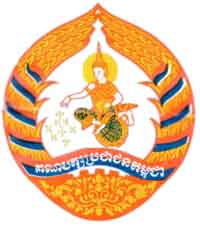
Cambodian People’s Party (CPP)
Originally established as the Marxist-Leninist Kampuchean People’s Revolutionary Party on June 28, 1951, the reformist Cambodian People’s Party (CPP) has ruled Cambodia since the Khmer Rouge regime fell in January 1979. The CPP entered the first elections sponsored by the United Nations Transitional Authority in Cambodia (UNTAC) in 1993, but lost to FUNCINPEC, the royalist party. With King Norodom Sihanouk’s intervention, FUNCINPEC and the CPP agreed to form a coalition government in 1993, and Hun Sen became the co-prime minister. Hun Sen became the president of the CPP in June 2015.
Sources
“CPP today marks 59 years since founding,” The Cambodian Daily
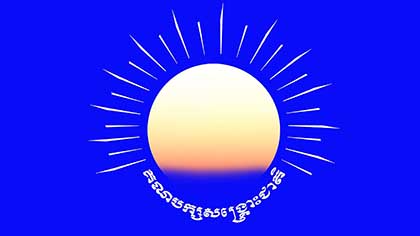
Cambodia National Rescue Party (CNRP)
The Cambodia National Rescue Party (CNRP) was founded on July 17, 2012 when Kem Sokha’s Human Rights Party (HRP) and Sam Rainsy’s Sam Rainsy Party (SRP) merged. Sam Rainsy, a former finance minister who founded an opposition party in 1995, was president and Kem Sokha, long a voice for political rights, as well as social and economic development, at village level, was the vice president.
The CNRP entered its first elections in 2013, and won 55 seats of the 123 places in the National Assembly.
On February 11, 2017, Sam Rainsy, the self-exiled president of the CNRP, resigned from his post in an attempt to save the party from dissolution after Hun Sen threatened to change the law to enable the government to dissolve parties whose officials had committed criminal offenses. Sam Rainsy had been convicted in absentia
In March 2017, Kem Sokha succeeded Sam Rainsy as the CNRP president. On September 3, 2017, Kem Sokha was arrested at his home in Phnom Penh for alleged treason, accused by the government of conspiring with the United States to bring down the Cambodian government.
On November 16, 2017, Cambodia’s Supreme Court ordered the dissolution of the CNRP. Some opposition members joined the CPP, while many fled the country or were forced out of politics.
Sources
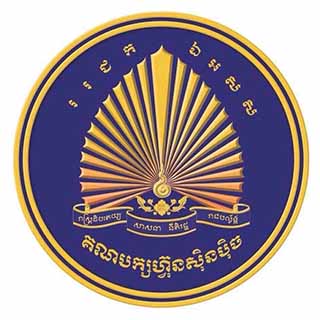
FUNCINPEC
National United Front for an Independent, Neutral, Peaceful and Cooperative Cambodia (FUNCINPEC) was founded in 1981 by Prince Norodom Sihanouk as a movement against the Vietnam-backed People’s Republic of Kampuchea government. In 1991, Prince Norodom Sihanouk handed over the movement to Prince Norodom Ranariddh. FUNCINPEC, an acronym from the party’s name in French, the language of Cambodia’s European colonizers from 1863 to 1953, became a political party in 1992.
FUNCINPEC participated in the national election sponsored by the United Nations Transitional Authority in Cambodia (UNTAC) in 1993. The party won the election, but Prime Minister Hun Sen refused to step down. With King Norodom Sihanouk’s intervention, Prince Norodom Ranariddh and Hun Sen agreed to form a coalition government, becoming co-prime ministers until 1997 when their personal animus erupted into July 1997 street fighting between armed forces loyal to Hun Sen and Prince Ranariddh. Hun Sen’s forces won and the prince went into exile.
Sources
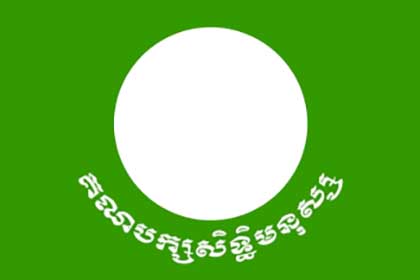
Human Rights Party (HRP)
Human Rights Party (HRP) was founded on July 22, 2007 by Kem Sokha. The party entered its first Cambodian national elections in 2008, and won three seats out of 123 in the National Assembly.
Sources
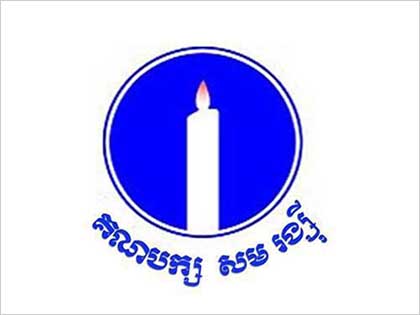
Sam Rainsy Party (SRP)
Sam Rainsy Party (SRP) was originally founded in 1995 as the Khmer Nation Party by Sam Rainsy. The SRP won 15 seats in the National Assembly in Cambodia’s 1998 national elections. In the 2003 elections, the SRP won 22% of the votes, becoming the second-most popular party in the country after Hun Sen’s CPP.
Sources
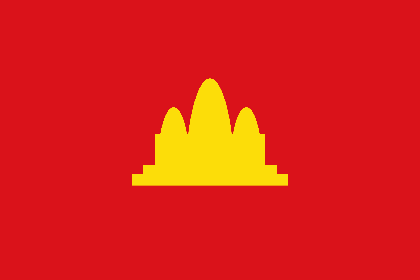
Khmer Rouge
The Khmer Rouge also known as the Kampuchean People’s Revolutionary Party took control of Cambodia on April 17, 1975. Under Pol Pot, they adopted a radical Maoist and Marxist-Leninist ideologies and wanted to transform Cambodia into a self-sufficient agrarian, classless society. The regime targeted professionals, intellectuals including teachers, Buddhist monks, anyone suspected of having ties to the former Cambodian government or foreign governments, and ethnic minorities. The regime forced people to move out of the cities to rural provinces where forced labor, malnutrition, disease, and mass executions killed approximately 1.7 million people or a quarter of the country’s population by the time the Vietnamese invasion toppled the Khmer Rouge on January 7, 1979.

